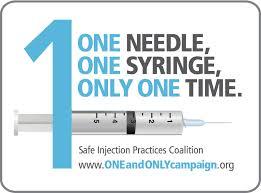
One of the dangers tied to drug abuse is the risk of transmitting disease through needle sharing. Dirty needles are a common vehicle for HIV, Hepatitis C, Hepatitis B and other serious infections. A proven solution is providing access to clean needles and a safe place to dispose of dirty ones. A local doctor wants to start Homer’s first syringe exchange program.
Alaska has a bad track record when it comes to IV drug use. Heroin abuse alonedoubled in the state between 2007 and 2013.
The World Health Organization blames five to ten percent of the world’s new HIV cases on IV drug abuse. And the Centers for Disease Control and Prevention says the same for 60% of new Hepatitis C cases in the United States.
“The one we see most commonly in Alaska is Hepatitis C,” said Sarah Spencer.
Dr. Sarah Spencer works in addiction medicine at Homer Medical Center in Homer and Ninilchik Tribal Clinic. She wants to start a syringe exchange program. A place people can drop off their used needles in exchange for clean ones.
“And also things like sterile cotton that they would use in the process of injecting IV drugs,” said Spencer.
She says exchanges reduce cases of HIV and Hepatitis by between 30% and 50%.
“About a thousand people in Alaska are diagnosed with Hepatitis C every year. It’s actually significantly more contagious than HIV. HIV is still certainly around but it’s not nearly as prevalent as Hepatitis C,” said Spencer.
On top of viruses – which include Hepatitis B – Spencer says dirty needles can also cause bacterial infections that are even more common and can be more dangerous.
“Those can occur even if somebody is not sharing a needle,” said Spencer.
Say someone is using an old needle over and over again. The needle gets dirty and they may not take simple precautions like using alcohol wipes to clean the injection site.
“And that bacteria will get underneath the skin with the needle and can cause skin infections, abscesses and boils under the skin caused by staph bacteria,” said Spencer.
Spencer says those infections often lead to emergency room visits, occasionally blood poisoning, infection of the heart valves…
“…which we call endocarditis and from there it can actually spread through the whole body and cause abscesses in your brain, your lungs [and] really horrible life threatening diseases that are very difficult to treat, even with antibiotics,” explained Spencer.
Spencer says a syringe exchange program could stop that from happening. There are only three in Alaska. They’re in Juneau, Fairbanks and Anchorage.
“The AMA (American Medical Association), the National Institute of Health [and] the Surgeon General have all reviewed the evidence and every single one of them has come to the same conclusion. These programs save money and they reduce the spread of disease,” said Spencer.
But, could an exchange program unintentionally encourage drug use?
Spencer says no. Exchanges actually help decrease drug use because drug addicts can be steered into treatment.
The cost savings Spencer mentioned comes from a drop in hospital bills.
“Many of the people who are using IV drugs are not in a position where they’re able to work. Many of them don’t have health insurance. When they have a life threatening illness and they seek emergency care for that the taxpayer is going to pay the bill,” explained Spencer.
She says each case of hepatitis C can cost $100,000 to treat but an entire year’s supply of syringes for one person is around $500.
Starting an exchange is relatively easy. There are grant opportunities for funding. Manpower can come from volunteers and supplies can be bought cheaply in bulk. Spencer says the hard parts will be finding a way to get rid of dirty needles safely and finding a building to work out of.
“The city government, the hospital, [or] a private organization; someone has to be willing to allow a space to be used several times a month,” said Spencer.
It’s impossible to say how many people would use a syringe exchange in Homer. Spencer says the average number of IV drug users in the country is between one and two percent of the population.
Quinton Chandler is a reporter at KTOO in Juneau.




